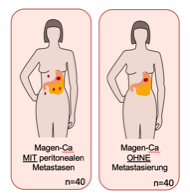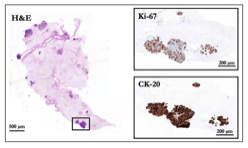Two new research grants by Berliner Krebsgesellschaft


Peritoneal metastasis, especially derived from gastric cancer (GC), has a poor prognosis with a median survival of only months. Treatment is usually confined to palliative systemic chemotherapy, complemented individually by checkpoint inhibitors that block PD1-signaling. Innovative therapies combining surgery with local drug application such as hyperthermic intraperitoneal chemotherapy (HIPEC) or pressurized intraperitoneal aerosol chemotherapy (PIPAC) are still pending confirmation in clinical trials. Purinergic signaling, which involves ATP hydrolysis and generation of adenosine, regulated through CD39 (ENTPD1) and related enzymes, has been recognized as a critical immunoregulatory pathway in the tumor microenvironment (TME). The objective of the current project is to characterize the immune environment in the unique setting of peritoneal metastasis of gastric cancer with a focus on ectonucleotidases CD39 and ENTPD3 on T cells, macrophages and MDSC as well as mechanisms of ectonucleotidase-mediated immune regulation in tumor associated macrophages in vitro. As a high-volume center for surgical therapy of peritoneal malignancies and with years of experience in ectonucleotidase research, we aim to advance the understanding of peritoneal metastasis and contribute to improving treatment options for our patients.

Colorectal cancer (CRC) is the second leading cause of cancer-related death worldwide, with approximately 900,000 annual deaths. 30-50% of patients develop colorectal liver metastases (CRLM) during their disease. More than 50% of these tumors have mutations in the KRAS oncogene, making them usually poorly treatable. Despite multimodal therapy concepts have improved the outcome of these patients, a large proportion of patients suffer a recurrence of their disease. For better therapeutic concepts, we need to better understand the tumor biology and metastatic mechanisms of these diseases. In vitro models, such as two-dimensional cell culture, are primarily used for this purpose. These models can only reflect the physiological complexity to a limited extent. Recently, it was shown that the use of organ-specific and tumor-specific extracellular matrix (ECM) has an impact on the behavior of human CRC cell lines. Culture of cell lines with decellularized matrix resulted in cells adopting a metastatic cell state and forming significantly more metastases in a mouse model than cells cultured on plastic or collagen. The goal of our project is to study the growth (with and without inhibition of the RAS/MAPK signaling pathway) of patient-derived tumor organoids growing on different decellularized metastatic matrices (dMM) and decellularized liver matrices (dLM). These studies of tumor matrix heterogeneity are essential to define which starting materials, for in vitro modeling of our three-dimensional tumor organoid culture, can be used to develop the most physiological, personalized dLM/dMM-based CRLM in vitro model possible. Based on these results, we plan to conduct small-scale therapy evaluations for personalized tumor therapy using our in vitro dLM/dMM-based CRLM in the near future.
Congratulations!